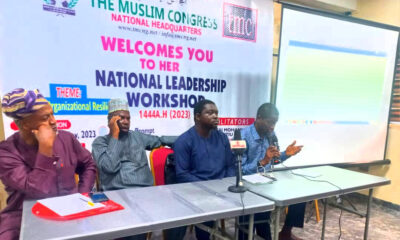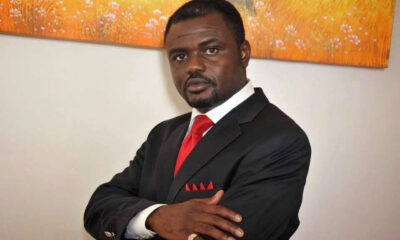Opinion
The day alcohol showed me shégè

The day alcohol showed me shégè
(1)
Tunde Odesola
(Published in The PUNCH, on Friday, January 10, 2025)
I told this true-life story to my children a long time ago. But I censored its indecent climax because of their young age. Today, I’m going to tell it in full because they have come of age. I don’t mean this story to be a comedy. I mean it to be a piece over which guardians, parents, teachers, mentors and all can chew the cud and consider which tactic is more effective in child upbringing: spare the rod or spank the child?
Growing up under my parents’ roof, the Holy Bible was worshipped. If it mistakenly falls down from your hands, you must fast for a day. That was the unwritten law enforced by my mother. Every child owned a Bible and a bed. Your Bible must be under or beside your pillow, and your bed must be neat because father and mother drummed it into our ears that cleanliness was next to godliness.
A verse in the Book of Proverbs 13:24 that says, “Spare the rod and spoil the child,” was a refrain within the family. Its corollary in the same Book of Proverbs 22:15 (New Living Translation) says, “A youngster’s heart is filled with foolishness, physical discipline will drive it far away.” In its version, God’s Word Translation of the Bible says, “Foolishness is firmly attached to a child’s heart. Spanking will remove it far from him,” and the New King James version says, “Foolishness is bound up in the heart of a child; The rod of correction will drive it far from him.”
But my literate parents will never quote any of the English interpretations. They prefer the Yoruba version which talks about the MADNESS in the heart of a child and the need for exorcising it with a cane: “Àyà omodé nì wèrè dì sí, egba ló máa túu.” I think they quote the Yoruba version to amplify the lodging of madness in a child’s mind and justify their deployment of the cane.
Therefore, canes were part of our home’s furnishings but many of the canes vanished into the thin air without me knowing anything about how they disappeared, I swear.
READ ALSO:
- Tax reform: Tinubu has agreed to amend controversial clauses, says Gov Sule
- Los Angeles wildfires: Five die as wildfire sweeps through California (photos)
- Tinubu orders probe into ISWAP attack on Borno military base
In the Holy Quran, Prophet Mohammed (SAW) orders the beating of a child for purposes of correction.
Because I was growing like a rampant corn stalk in raining season, mother soon abandoned caning me as each flogging episode was akin to wrestling that left her with body aches. Then, she employed ìfótí olóòyì aka brain-resetting slaps but when I blocked her slaps repeatedly with my bony arms and her wrists hurt, she jettisoned that idea, too. She finally resorted to verbal chastisement and threat, “You wait till your father returns from work and see if I won’t report you to him.” And she always made good her threat.
My father was predictable. The first thing he does when he comes back from work is go on his knees and pray. The second thing he does is get a bath. Food is the third. If my mother told him about my sins as soon as he got home, he would order me to stoop down while he got a bath and ate. As a child, I used to think the punishment was called ‘stood down’.
It’s the foolish that gets famished when fasting, goes a Yoruba proverb. When my father was out of sight, I would sit on the floor and listen attentively to pick up his footfalls. If my mother passed by and saw me observing the punishment in breach, she would complain loudly so my father could hear I wasn’t doing what he ordered me to do. Double wàhálà.
At times, when I rush to bed before nightfall in order to evade the arrival of my father, my mother would barge into my room without knocking, upon the arrival of her husband, and peel my blanket off me, announcing with relish, “Daddy e ti de. O n pe e” – “Your daddy is back, he’s calling you.”
To picture the state of my mind whenever I ‘stood down’ waiting for sentencing is to imagine the mind of a goat cornered by a lion. I was the stubborn goat, my father was the lion.
That was the kind of house that produced me. A house of five male children and a female. A house that requites good deeds with rewards and punishes wrongdoing severely. I remember everything clearly. I remember we, the children, had Chopper bicycles. I remember plucking out my eyelashes and putting them on my head as a fetish for my parents to forget my wrongdoings and not punish me. Sometimes, it worked; sometimes, it didn’t. In all this, I always remembered the son of whom I am.
But, reminiscing on my secondary school days, I arrived at the intersection of doubt as to my long-held belief that sparing the rod spoils the child. When you’re raised in my kind of home, the tendency is for you to agree that the use of the rod was divine and productive.
However, I have some doubts today. Today, I’d rather a cane was kept at home, used rarely, while moral suasion took centre stage in child upbringing.
I lay the validity of my argument on this story below.
At the Archbishop Aggey Memorial Secondary School, Mushin, we were four bright friends – Akeem Adigun, Akinade Ayodeji, Jide Oladimeji and my humble self.
READ ALSO:
- Nigeria is not working, says Igboho, calls for separation
- Cross River commissioner dies after attending exco meeting
- Omokri faults Traore meeting Mahama with weapon, recalls how Obasanjo stopped Gadaffi
We had some other friends who were not bright. When examination approached, some of my struggling friends would ask me a favour – to sit with me during the exam period. But only one student could sit beside me in an examination. So, to grant their requests, I devised a plan that we all should sit in the same row, with a bright student pairing with a dull student.
In the early 80s, there was an Italian wrestling duo – Gino Brito and Dino Bravo – called the ‘Love Brothers’ of the International Wrestling Federation fame. We adopted their name, Love Brothers.
My house was a favourite rendezvous for the Love Brothers because it offered eat-in food and grocery takeaways from my mother. One day, we carried our sàárà food offering past the mosque when we went to Akeem’s house.
Akeem was living with his foster parents in a three-storey building right at Olorunsogo bus stop, Mushin. We all pass by his house to and fro school.
On this particular ‘ojo buruku esu gbomimu’ day, I think someone said he wanted to drink water. Instead of waiting downstairs for Akeem to go and bring water, we all ran to the topmost floor.
Instead of allowing Akeem to bring water from their tall refrigerator, some of us ran towards it, each curious rat wanting to behold the occupants of the refrigerator. When Akeem opened the fridge, we saw water, food and more.
We saw rows and rows of assorted beers imprisoned in the bowel of the refrigerator, begging to be set free. And we did set some beers free together with the pots of rice and soup in the refrigerator. We all departed happily thereafter.
The next morning, I saw Akeem in front of the assembly ground while students were singing devotional hymns. He wasn’t standing alone. His foster mother was beside him. Right behind them were some fearsome male teachers. Akeem was staring at the floor.
After the day’s announcements were made and the national anthem and pledge were rendered, students sang as they marched to their various classrooms. The first to go were Class One students of various arms, followed by Classes Two and Three students.
The die is cast. I watched him pick out his fellow criminals – Jide, Akin etc – as they were marching to class. Quickly, I sneaked from the rows of the knicker-wearing junior classes, where I belonged, to Class Four row, which was trousers-wearing.
Luckily for me, some Class Four students wear shorts even though the right uniform for them to wear was a light blue shirt over dark blue trousers.
Life and its absurdities. The dream of every Class Three male student was to wear trousers when they got to Class Four, yet some Class Four male students refused to wear trousers when the handle of the machete was in their hands. Left-Right! Leff-Rai!! I marched with senior students past Akeem who wasn’t expecting me in Class Four.
After escaping the assembly crackdown, I fled to the school farm. Akeem’s co-conspirators, who were not ferreted out at the assembly ground, were picked up in the classroom. Although no bounty was placed on my head, a manhunt was declared for me while I nestled under cocoyam leaves on the school farm, pretending to be reading.
Intelligence soon reached the staffroom and a crack team of hefty seniors was dispatched to arrest me dead or alive. To date, I do not know the Judas who sold me out. When emissaries from the staffroom stormed the school farm, I submitted myself like a lamb, and they led me to Golgotha.
To be continued.
Email: tundeodes2003@yahoo.com
Facebook: @Tunde Odesola
X: @Tunde_Odesola
The day alcohol showed me shégè
Opinion
AFCON 2025: Flipping Content Creation From Coverage to Strategy

AFCON 2025: Flipping Content Creation From Coverage to Strategy
By Toluwalope Shodunke
The beautiful and enchanting butterfly called the Africa Cup of Nations (AFCON) emerged from its chrysalis in Khartoum, Sudan, under the presidency of Abdelaziz Abdallah Salem, an Egyptian, with three countries—Egypt, Sudan, and Ethiopia—participating, and Egypt emerging as the eventual winner.
The reason for this limited participation is not far-fetched. At the time, only nine African countries were independent. The remaining 45 countries that now make up CAF’s 54 member nations were either pushing Queen Elizabeth’s dogsled made unique with the Union Jack, making supplications at the Eiffel Tower, or knocking at the doors of the Palácio de Belém, the Quirinal Palace, and the Royal Palace of Brussels—seeking the mercies of their colonial masters who, without regard for cultures, sub-cultures, or primordial affinities, divided Africa among the colonial gods.
From then until now, CAF has had seven presidents, including Patrice Motsepe, who was elected as the seventh president in 2021. With more countries gaining independence and under various CAF leaderships, AFCON has undergone several reforms—transforming from a “backyard event” involving only three nations into competitions featuring 8, 16, and now 24 teams. It has evolved into a global spectacle consumed by millions worldwide.
Looking back, I can trace my personal connection to AFCON to table soccer, which I played alone on concrete in our balcony at Olafimihan Street—between Mushin and Ilasamaja—adjacent to Alafia Oluwa Primary School, close to Alfa Nda and Akanro Street, all in Lagos State.
Zygmunt Bauman, the Polish-British sociologist who developed the concept of “liquid modernity,” argues that the world is in constant flux rather than static, among other themes in his revelatory works.
For the benefit of Millennials (Generation Y) and Generation Z—who are accustomed to high-tech pads, iPhones, AI technologies, and chat boxes—table soccer is a replica of football played with bottle corks (often from carbonated drinks or beer) as players, cassette hubs as the ball, and “Bic” biro covers for engagement. The game can be played by two people, each controlling eleven players.
I, however, enjoyed playing alone in a secluded area, running my own commentary like the great Ernest Okonkwo, Yinka Craig, and Fabio Lanipekun, who are all late. At the time, I knew next to nothing about the Africa Cup of Nations. Yet, I named my cork players after Nigerian legends such as Segun Odegbami, Godwin Odiye, Aloysius Atuegbu, Tunji Banjo, Muda Lawal, Felix Owolabi, and Adokiye Amiesimaka, among others, as I must have taken to heart their names from commentary and utterances of my uncles resulting from sporadic and wild celebrations of Nigeria winning the Cup of Nations on home soil for the first time.
While my connection to AFCON remained somewhat ephemeral until Libya 1982, my AFCON anecdotes became deeply rooted in Abidjan 1984, where Cameroon defeated Nigeria 3–1. The name Théophile Abéga was etched into my youthful memory.
Even as I write this, I remember the silence that enveloped our compound after the final whistle.
It felt similar to how Ukrainians experienced the Battle of Mariupol against Russia—where resolute resistance eventually succumbed to overwhelming force.
The Indomitable Lions were better and superior in every aspect. The lion not only caged the Eagles, they cooked pepper soup with the Green Eagles.
In Maroc ’88, I again tasted defeat with the Green Eagles (now Super Eagles), coached by the German Manfred Höner. Players like Henry Nwosu, Stephen Keshi, Sunday Eboigbe, Bright Omolara, Rashidi Yekini, Austin Eguavoen, Peter Rufai, Folorunsho Okenla, Ademola Adeshina, Yisa Sofoluwe, and others featured prominently. A beautiful goal by Henry Nwosu—then a diminutive ACB Lagos player—was controversially disallowed.
This sparked outrage among Nigerians, many of whom believed the referee acted under the influence of Issa Hayatou, the Cameroonian who served as CAF president from 1988 to 2017.
This stroll down memory lane illustrates that controversy and allegations of biased officiating have long been part of AFCON’s history.
The 2025 Africa Cup of Nations in Morocco, held from December 21, 2025, to January 18, 2026, will be discussed for a long time by football historians, raconteurs, and aficionados—for both positive and negative reasons.
These include Morocco’s world-class facilities, the ravenous hunger of ball boys and players (superstars included) for the towels of opposing goalkeepers—popularly dubbed TowelGate—allegations of biased officiating, strained relations among Arab African nations (Egypt, Algeria, Tunisia, and Morocco), CAF President Patrice Motsepe’s curt “keep quiet” response to veteran journalist Osasu Obayiuwana regarding the proposed four-year AFCON cycle post-2028, and the “Oga Patapata” incident, where Senegalese players walked off the pitch after a legitimate goal was chalked off and a penalty awarded against them by DR Congo referee Jean-Jacques Ndala.
While these narratives dominated global discourse, another critical issue—less prominent but equally important—emerged within Nigeria’s media and content-creation landscape.
Following Nigeria’s qualification from the group stage, the Super Eagles were scheduled to face Mozambique in the Round of 16. Between January 1 and January 3, Coach Eric Chelle instituted closed-door training sessions, denying journalists and content creators access, with media interaction limited to pre-match press conferences.
According to Chelle, the knockout stage demanded “maximum concentration,” and privacy was necessary to protect players from distractions.
This decision sparked mixed reactions on social media.
Twitter user @QualityQuadry wrote:
“What Eric Chelle is doing to journalists is bad.
Journalists were subjected to a media parley under cold weather in an open field for the first time in Super Eagles history.
Journalists were beaten by rain because Chelle doesn’t want journalists around the camp.
Locking down training sessions for three days is unprofessional.
I wish him well against Mozambique.”
Another user, @PoojaMedia, stated:
“Again, Eric Chelle has closed the Super Eagles’ training today.
That means journalists in Morocco won’t have access to the team for three straight days ahead of the Round of 16.
This is serious and sad for journalists who spent millions to get content around the team.
We move.”
Conversely, @sportsdokitor wrote:
“I’m not Eric Chelle’s biggest supporter, but on this issue, I support him 110%.
There’s a time to speak and a time to train.
Let the boys focus on why they’re in Morocco—they’re not here for your content creation.”
From these three tweets, one can see accessibility being clothed in beautiful garments. Two of the tweets suggest that there is only one way to get to the zenith of Mount Kilimanjaro, when indeed there are many routes—if we think within the box, not outside the box as we’ve not exhausted the content inside the box.
In the past, when the economy was buoyant, media organisations sponsored reporters to cover the World Cup, Olympics, Commonwealth Games, and other international competitions.
Today, with financial pressures mounting, many journalists and content creators seek collaborations and sponsorships from corporations and tech startups to cover sporting events, who in turn get awareness, brand visibility, and other intangibles.
As Gary Vaynerchuk famously said, “Every company is a media company.” Yet most creators covering AFCON 2025 followed the same playbook.
At AFCON 2025, most Nigerian journalists and content creators pitched similar offerings: on-the-ground coverage, press conferences, team updates, behind-the-scenes footage, analysis, cuisine, fan interactions, and Moroccan cultural experiences.
If they were not interviewing Victor Osimhen, they were showcasing the stand-up comedy talents of Samuel Chukwueze and other forms of entertainment.
What was missing was differentiation. No clear Unique Selling Proposition (USP). The result was generic, repetitive content with little strategic distinction. Everyone appeared to be deploying the same “Jab, Jab, Jab, Hook” formula—throwing multiple jabs of access-driven content in the hope that one hook would land.
The lesson is simple: when everyone is jabbing the same way, the hook becomes predictable and loses its power.
As J. P. Clark wrote in the poem “The Casualties”, “We are all casualties,” casualties of sameness—content without differentiation. The audience consumes shallow content, sponsors lose return on investment, and creators return home bearing the “weight of paper” from disappointed benefactors.
On November 23, 1963, a shining light was dimmed in America when President John F. Kennedy was assassinated.
As with AFCON today, media organisations sent their best hands to cover the funeral, as the who’s who of the planet—and if possible, the stratosphere—would attend. Unconfirmed reports suggested that over 220 VVIPs were expected.
While every newspaper, radio, and television station covered the spectacle and grandeur of the event, one man, Jimmy Breslin, swam against the tide. He chose instead to interview Clifton Pollard, the foreman of gravediggers at Arlington National Cemetery—the man who dug John F. Kennedy’s grave.
This act of upended thinking differentiated Jimmy Breslin from the odds and sods, and he went on to win the Pulitzer Prize in 1986.
Until journalists and content creators stop following the motley and begin swimming against the tide, access will continue to be treated as king—when in reality, differentiation, aided by strategy, is king.
When every journalist and content creator is using Gary Vaynerchuk’s “Jab, Jab, Jab, Hook” template while covering major sporting events, thinkers among them must learn to replace one jab with a counterpunch—and a bit of head movement—to stay ahead of the herd.
Toluwalope Shodunke can be reached via tolushodunke@yahoo.com
Opinion
“Christian Genocidization” of the Kaiama massacre, By Farooq Kperogi

“Christian Genocidization” of the Kaiama massacre, By Farooq Kperogi
“Christian Genocidization” of the Kaiama massacre, By Farooq Kperogi
Kperogi is a renowned Nigerian columnist and United States-based professor of Journalism
Opinion
Descending from Fela’s Afrobeat to Wizkid’s Afrobeats

Descending from Fela’s Afrobeat to Wizkid’s Afrobeats
Tunde Odesola
(Published in The PUNCH, on Friday, January 30, 2026)
Three occupants of a black Mercedes-Benz were heading to work on a good Friday morning. One was the driver, another was the aide, and their oga patapata. They came to crawling traffic on George Street in Ikoyi, Lagos, en route to Obalende, their office. The Federal Secretariat was at a touching distance.
Suddenly, a hail of gunshots rained on the black Benz like a hundred stones from the devil’s sling. Then the tyres screeched away. Then silence. Rivulets of hot blood trickled from the heads and torsos of the driver, the aide and General Murtala Ramat Mohammed. This was February 13, 1976, the first bad Friday I knew.
The second bad Friday was on February 18 of the following year. I had bounced off to St Paul’s Anglican Primary School, Idi-Oro, Lagos, in the morning, having celebrated a quiet birthday a day before. Except for the khaki-wearing planners of sorrows, tears and blood, no one else had a foreboding of what lay ahead in the day.
My class was in full session on the middle floor of the school’s two-storey wing when the news broke and shattered peace and learning. “Soldiers are attacking Fela’s house! Lagos is on fire!”
Yeepa! Fela’s house was a stone’s throw from my school. Before the teacher finished passing the information to the class, she had grabbed her bag, just as the school bell sounded, summoning everyone to the assembly ground. Exhibiting no emotion, a fair-complexioned, slim and fatherly teacher, Mr Mayungbe, disclosed the reason why the school was closing abruptly, strictly warning pupils to head straight home.
He said pupils whose homes were around Fela’s house in the Moshalashi area should wait behind for their parents and guardians to come and pick them up. Subsequently, our class teachers brought out the registers containing pupils’ addresses, calling those whose houses were not around Fela’s house to head home. My name was called. I jumped out, my bag slung across my back and headed towards the gate.
READ ALSO:
- Garba Shehu Explains Why Buhari Approved Hadiza Bala Usman’s Removal from NPA
- Police Commission Appoints New DIG, Promotes 2 AIGs, 26,119 Inspectors Nationwide
- Petrol Prices Poised to Rise Again as Global Crude Oil Market Surges
At the school gate, I thought it was a betrayal to go home and not witness the injustice soldiers were inflicting on the beautiful white house of my hero; the house located by a bend, the house whose architecture I beheld and ogled at during incessant truancy trips. So, I headed to Fela’s house located on No 14 Agege Motor Road, Idi-Oro, where thousands of soldiers were deployed to destroy a harmless civilian, his family and livelihood. Yes, livelihood, because the house had a recording facility. It also had a free health clinic. This was during the military regime headed by General Olusegun Obasanjo, an Egba man like Fela. The barbaric soldiers threw Fela’s 78-year-old mother through the window of the storey building. And she died.
To weigh in on the supremacy fire raging between Fela’s son, Seun, and Afrobeats star, Ayodeji Balogun, popularly known as Wizkid, the aforementioned background from the eyes of a little boy sheds light on the indomitable spirit of the Abami Eda, and why his legacy as the founder and father of Afrobeat is forever encased in gold.
Without ever meeting Wizkid, I wrote a two-part article titled “The god that cut soap for Wizkid” in THE PUNCH more than two years ago. The articles, published in the month of September 2023, extol the humility of Wizkid’s mother, Mrs Morayo Balogun, and the grace upon the life of her superstar son, Ayodeji.
On Friday, May 19, 2023, in a public show of shame, Seun slapped a police officer on the Third Mainland Bridge. I penned “Seun Kuti’s double-edged slap” to criticise Seun’s arrogance and stupidity. Seun’s action on that day exposes the impunity men and women of power and influence inflict when relating with people they consider lower on the social rungs. Fela, despite his avowed stance on human rights advocacy, reportedly fell short on that account on a number of occasions. Neither is Wizkid a saint in this regard. Nigeria’s big men, more often than not, exploit the weakness in law enforcement to get away with any crime. A power monger called Wasiu Ayinde disrupted a flight and attempted to stop a plane from taking off; instead of a time in jail, he was given an award. Because he was close to President Bola Tinubu.
Let’s be clear from the outset, please. This article is not a magisterial judgment on who is right or wrong in the Seun-Wizkid fight. Mark my words – Seun-Wizkid fight, not Fela-Wizkid fight. To place Fela on the same pedestal as Wizkid is to compare the storm in a teacup with the roar of the Atlantic. Igi imu jinna si ori, the distance between the nose and forehead is far. It is arduous for the fingerless fellow to thread the thread through the eye of the needle. Fela is the creator, Wizkid is the creation.
A product of the University of Ibadan and the Imperial College, London, where he specialised in Sound Processing, octogenarian music producer, the legendary Odion Iruoje, is renowned as the producer of Nigeria’s first true pop music with his collaboration with the teenage sensation band, Ofege. Iruoje, who produced a series of Fela’s first hits, including ‘Jeun Kooku’, ‘Beautiful Dancer’, ‘Alijonjokijo’, and ‘Ojuelegba’, gave an insight into how Fela created Afrobeat.
READ ALSO:
- Emefiele Allegedly Withdrew $6.23 Million Using Forged Documents — Witness Testifies
- APC Opens Dialogue With Wike to End Fubara Crisis in Rivers
- Lassa Fever Kills 17 Nigerians Across Eight States in Three Weeks — NCDC
In an interview on popular online media, Agbaletu TV, Iruoje, who read Industrial Electronics and Control Systems, said Fela came to one of the foremost recording companies in the country, E.M.I, upon returning from England, where he recorded an unsuccessful album, ‘Won Fe Gba Aya Wa’, with E.M.I. in London. The sound guru described Fela as a troublemaker whom E.M.I London didn’t want to deal with.
“When he came to me, he said, ‘Mr Iruoje, I have a new sound now, and it is called Afrobeat’. I told him what sound do you have that I have never heard before? I didn’t understand what he was saying. I told him there’s no sound you are going to play outside Highlife. So, I went to audition (him). Goodness! I couldn’t believe it when he started the horns. I have never heard such a horn arrangement in my life. No one ever did that – plenty of horns – the arrangement, ha! I couldn’t believe what I was hearing. I have never heard such a sound before. I said we have to go to the studio.
“In fact, the MD (a white man) came to my audition, he was listening to it, he said, ‘Mr Iruoje, please, can you get this man into the studio before he changes his mind?’ I said no, I have not finished with the rehearsal, he (the MD) said no, no, please, Mr Iruoje, you know he is very unstable, he could change his mind. I told the MD that Fela would not change his mind on me.
“The MD and I did not believe him when he first came to announce that he had a new sound. But he said, ‘Odion, come to the Shrine and listen to it, and see what few changes you want to do to it, and I went, we did a few changes. His rhythm guitar was (new), and first-time of his time, then he added tenor guitar and lead guitar. So, Fela had more guitars than the regular Highlife band. The regular Highlife band had only one guitar and bass, but Fela had all four. Fela influenced Juju bands because they started introducing tenor, rhythm and other guitars.”
On Fela’s flip side, Iruoje described the political activist, culture advocate and social crusader as a troublemaker, whom recording companies did not want to touch with a long pole. Because he gave E.M.I. London troubles over royalties, Iruoje was told by the authorities of the E.M.I branch in Nigeria not record Fela.
“If he signs a contract which states that his royalty would be so much (amount), that is what he signed before going to the studio, once he goes into the studio and the song starts selling and becomes a hit, he would say, “That song is no more N80 o, he wants to get N100 or N200. At times, he would snatch the master tape,” Iruoje said.
If told he signed a contract, Iruoje said, “Fela would say, what is contract? Contract is ordinary paper. That music is more than what is in the contract. He would snatch the master tape now, (and say) he was not going to release it. He (would say) we had to change that. Maybe, at times, I may not be in when he’s making the trouble, when I come back, they would say, “See what your man is doing o. He has taken (the master tape). Then I would send somebody to call him. He would come to my office because he respects me.”
To be continued.
Email: tundeodes2003@yahoo.com
Facebook: @Tunde Odesola
X: @Tunde_Odesola
Descending from Fela’s Afrobeat to Wizkid’s Afrobeats
-

 metro3 days ago
metro3 days agoLeadership Crisis at NAHCON as Chairman Abdullahi Saleh Usman Resigns
-

 News2 days ago
News2 days agoOyo Muslims Reaffirm Loyalty to Sultan on Islamic Matters — Grand Chief Imam
-

 News3 days ago
News3 days agoUS Judge Orders FBI, DEA to Release Tinubu’s Criminal Records, Faults Delays
-

 International3 days ago
International3 days agoUS to Deport 18 More Nigerians on ‘Worst-of-the-Worst’ Criminal List (Full Names)
-

 metro2 days ago
metro2 days agoFormer NAHCON Chief Explains Why He Stepped Down, Denies Conflicts
-

 Business3 days ago
Business3 days agoNaira Posts Strong Comeback, Breaking Two‑Year High Against Dollar
-

 metro1 day ago
metro1 day agoKwara, Katsina Bloodshed: TMC Condemns Attacks, Dismisses ‘Jihadist Preacher’ Claims
-

 News3 days ago
News3 days agoFayose Claims Presidency Told Wike to Respect Fubara or Risk Losing Job















